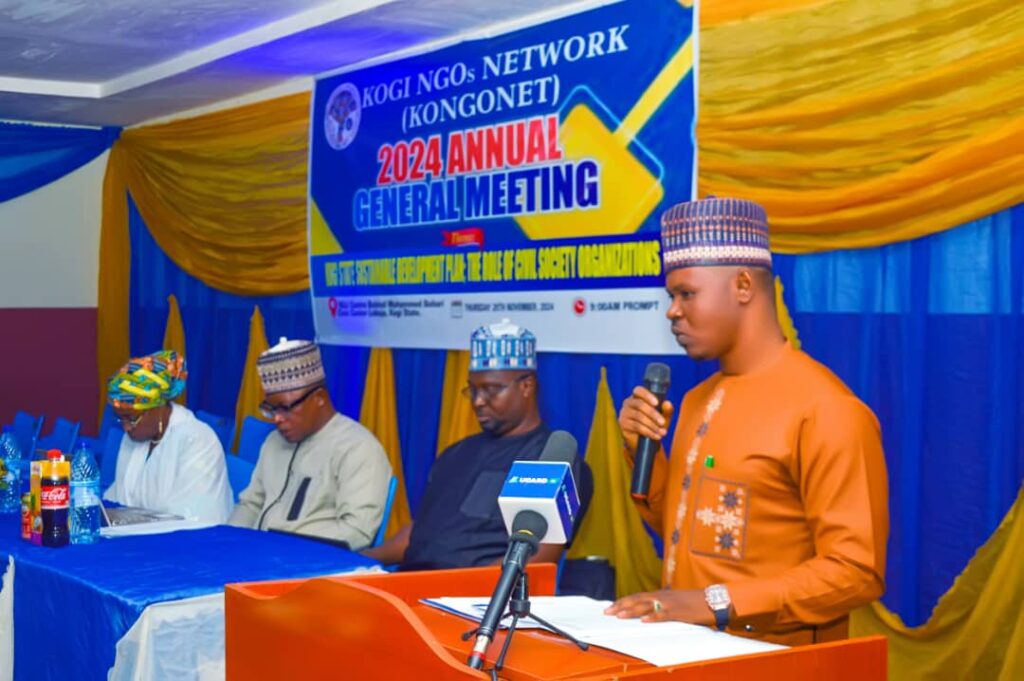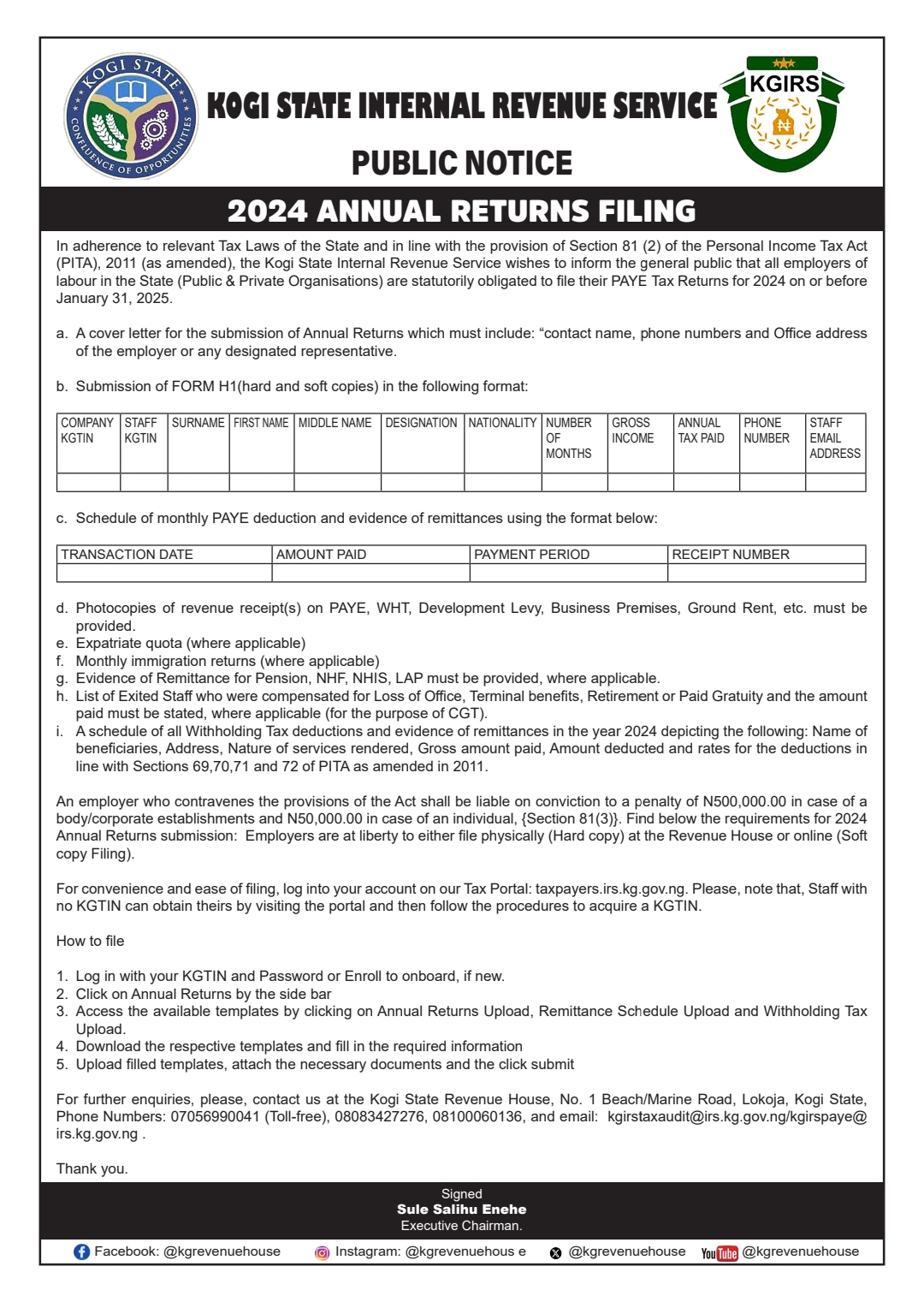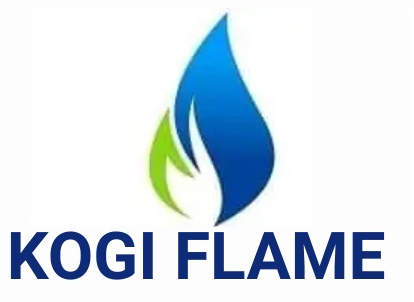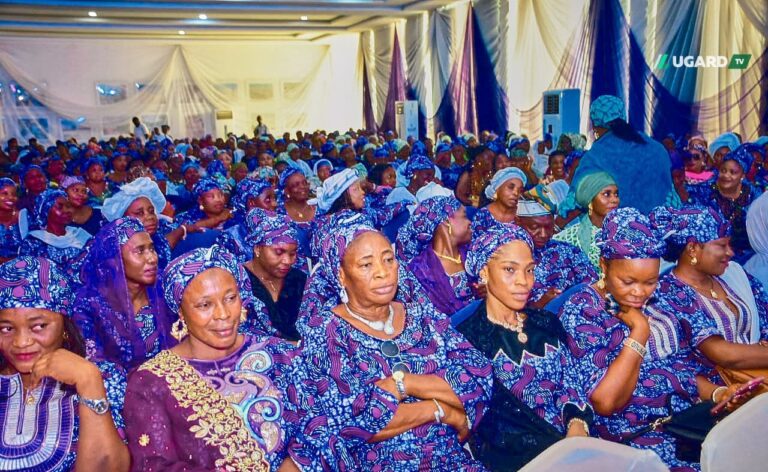


Kogiflame
The umbrella organization of civil society groups in Kogi state, Kogi NGOs Network, (KONGONET), has called on the state government to invest massively in agriculture to guarantee food security for the citizens, saying that agriculture remains the backbone of Kogi State’s economy and presents a viable pathway to economic recovery
The group also noted that Cheaper and Efficient transport system is critical to reducing the cost of goods and services, thereby improving access to markets, by establishing a subsidized public transport system.
This was contained in a Position Paper by Kogi NGOs Network (KONGONET) on “the Current Economic Hardship in Nigeria;
A Call for State-Specific Remediation Strategies” Presented at it’s 4th Annual General Meeting (AGM) held at NUJ Press Centre, Lokoja -Kogi State on Thursday 28th November, 2024 and co-signed by Ambassador Idris Ozovehe Muraina and Mr. Reuben Joshua, Chairperson and Secretary General of KONGONET respectively.
The position paper read in part said “Agricultural Development as the Foundation, remains the backbone of Kogi State’s economy and presents a viable pathway to economic recovery. By enhancing agricultural productivity, we can achieve food security, create jobs, and boost local economies.
They maintained that there must be adequate investment in Agricultural Infrastructure by government in the areas of irrigation systems, storage facilities, and access roads to ensure that farmers can produce and transport their goods efficiently.
While emphasizing that the modern agricultural systems have gone mechanical, they stressed that the state should make heavy investment in mechanization, Training and Support Programmes, by establishing training programmes for farmers on modern agricultural practices, pest control, and sustainable farming methods, which they noted can enhance productivity.
The group also identified access to Credit and Subsidies as another critical area, saying this can be done by Providing low-interest loans and subsidies for seeds and fertilizers which it said will enable farmers to increase their output and profitability.
On the transport Sector, the group called on the government to ensure cheaper and efficient transport Systems, noting that this is critical to reducing the cost of goods and improving access to markets by citizens, considering the hardship cause in the transport Sector as a result of the removal of fuel subsidy by the federal government.
It said Kogi State must focus on enhancing Rural Road Infrastructure, by improving existing roads and constructing new ones to ease movement of agricultural products and reduce transportation costs.
On public transport initiatives, they called for the establishment of a subsidized public transport system that can alleviate the burden of transportation costs on residents and ensuring that essential goods and services remain accessible.
Othe areas they want the government intervention includes;
Provision of affordable housing scheme, saying that housing insecurity is a significant issue that contributes to economic hardship.
“Kogi State should consider Developing Affordable Housing Projects. Collaborating with private developers to create low-cost housing units will provide shelter to low-income families and stimulate the local economy, Incentives for Home ownership, Implementing schemes that offer financial assistance for first-time home buyers can encourage property ownership and stability within communities.
On Healthcare , KONGONET noted that Healthcare accessibility is crucial for a productive workforce, saying that a subsidized health insurance scheme should be implemented to Provide Basic Health Coverage, Ensuring that all citizens have access to essential health services without financial strain, saying this will improve overall public health and productivity.- Community Health Initiatives
In conclusion, the group said Kogi NGOs Network (KONGONET) members are available to partner with the state government to share her experience, skills and social capital to ensure government continually meets its obligation to the citizens and residence of the state.
In addition, it said KONGONET will consistently support laudable initiatives of government to ameliorate the suffering of Kogites and ensure the state upholds the tenets of democracy and fair play in her administration of our collective resources.
“It is the collective responsibility of the government, civil society organizations, and citizens to work together and address these pressing issues as already outlined. By doing so, we can foster a prosperous and equitable future for the people of Kogi State, ensuring improved health, education, agriculture and wellbeing of the people. God Bless Kogi State. The group stressed
THE POSITION PAPER IN FULL.
A Position Paper by Kogi NGOs Network (KONGONET) on “the Current Economic Hardship in Nigeria:
A Call for State-Specific Remediation Strategies” Presented at her 4th Annual General Meeting (AGM) held at NUJ Press Centre, Lokoja -Kogi State on Thursday 28th November, 2024.
Esteemed colleagues, fellow citizens of Kogi State, ladies and gentlemen. The Kogi NGOs Network (KONGONET) hereby seize this opportunity of her 4th Annual General Meeting (AGM) today, to address a critical issue of great importance: the current economic hardship in the land.
The removal of subsidy on PMS and floating of the Naira have drastically affected the economic landscape of Nigeria, evolving into a myriad of factors, such as inflation, unemployment, and inadequate infrastructure.
Kogi State, like many others, has felt the brunt of these challenges, leading to increased poverty and reduced quality of life for its citizens.
According to scholars, the rise in Gross Domestic Product (GDP) does not translate into an improvement in the quality of life, rather Human Development Index (HDI) does better.
We believe it is imperative for us to develop and advocate for state-specific remediation strategies that addresses the current economic hardship in the state.
This position paper outlines a comprehensive approach centered on agriculture, affordable transportation, housing, health insurance, and empowerment schemes tailored to our state’s unique needs.
The Current Economic Hardship Recent data indicate that the cost of living in Nigeria has surged, with food prices skyrocketing and basic amenities becoming increasingly unaffordable. In Kogi State, this economic hardship manifests through high transportation cost, unemployment rates and limited access to essential services, exacerbating the plight of vulnerable populations.
The need for immediate and effective strategies to alleviate these hardships cannot be overstated.
Proposed Remediation Strategies;
1. Agricultural Development as the Foundation Agriculture remains the backbone of Kogi State’s economy and presents a viable pathway to economic recovery. By enhancing agricultural productivity, we can achieve food security, create jobs, and boost local economies.
The following strategies should be prioritized:- Investment in Agricultural Infrastructure: The government should invest in irrigation systems, storage facilities, and access roads to ensure that farmers can produce and transport their goods efficiently.
The modern agricultural systems have gone mechanical, the state should make heavy investment in mechanization. – Training and Support Programs: Establishing training programs for farmers on modern agricultural practices, pest control, and sustainable farming methods can enhance productivity.-
Access to Credit and Subsidies: Providing low-interest loans and subsidies for seeds and fertilizers will enable farmers to increase their output and profitability.
2. Cheaper Transportation Systems Efficient transportation is critical to reducing the cost of goods and improving access to markets. Kogi State must focus on:- Enhancing Rural Road Infrastructure: Improving existing roads and constructing new ones will ease movement of agricultural products and reduce transportation costs.-
Public Transport Initiatives: Establishing a subsidized public transport system can alleviate the burden of transportation costs on residents, ensuring that essential goods and services remain accessible.
3. Affordable Housing Scheme Housing insecurity is a significant issue that contributes to economic hardship. Kogi State should consider:- Developing Affordable Housing Projects: Collaborating with private developers to create low-cost housing units will provide shelter to low-income families and stimulate the local economy.- Incentives for Home ownership: Implementing schemes that offer financial assistance for first-time home buyers can encourage property ownership and stability within communities.
4. Subsidized Health Insurance SchemeHealthcare accessibility is crucial for a productive workforce. A subsidized health insurance scheme should be implemented to:- Provide Basic Health Coverage: Ensuring that all citizens have access to essential health services without financial strain, will improve overall public health and productivity.- Community Health Initiatives: Establishing mobile health clinics and community health programs can enhance service delivery, particularly in rural areas.
5. Age-Appropriate Empowerment Schemes Empowering citizens, especially the youth and women, is vital for a long-term recovery strategy for the state.
Empowerment should be data driven, the MDAs in partnership with civil society organizations should collaboratively coordinate data collection of vulnerable groups across the state and carry out a robust economic stimulating empowerment that cut-across skills acquisition programmes and other entrepreneurial initiatives that will be age- appropriate.
In conclusion, Kogi NGOs Network (KONGONET) members are available to partner with the state government to share her experience, skills and social capital to ensure government continually meets its obligation to the citizens and residence of the state.
KONGONET will consistently support laudable initiatives of government to ameliorate the suffering of Kogites and ensure the state upholds the tenets of democracy and fair play in her administration of our collective resources.
It is the collective responsibility of the government, civil society organizations, and citizens to work together and address these pressing issues as already outlined. By doing so, we can foster a prosperous and equitable future for the people of Kogi State, ensuring improved health, education, agriculture and wellbeing of the people. God Bless Kogi State.
Signed
Amb. Idris Ozovehe Muraina and
Mr. Reuben Joshua, Chairperson and Secretary General of KONGONET respectively,




